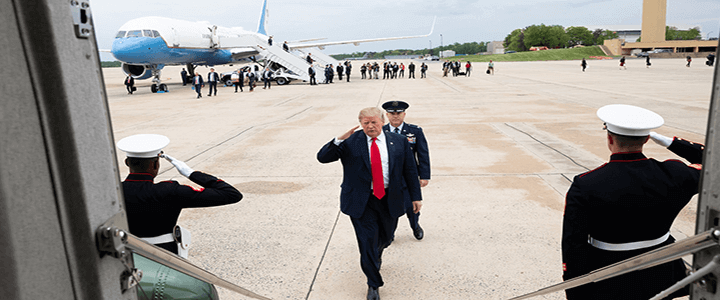In the early morning hours, President Trump welcomed home a plane carrying three American citizens held prisoner in North Korea.
Kim Hak-song and Tony Kim were both professors at the Pyongyang University of Science and Technology, a school for the children of North Korea’s elite. They were arrested two weeks apart last year, and charged with engaging in “hostile acts” against the regime of Kim Jong-un — whatever that means. Businessman Kim Dong-chul was charged with espionage. In 2016, he was sentenced to 10 years confinement at hard labor.
Traveling to the DPRK is never a good idea
One is left to wonder exactly in what kind of business a Korean-American would be engaging in North Korea (a country beset by ever-expanding sanctions and thus not a particularly hospitable environment for an American), or exactly why two men with American citizenship decided it would be a good idea to teach at a North Korean university.
Unless you’re the American secretary of state, traveling to North Korea is an inherently risky activity. It’s not without risk for Pompeo, either.
This is, after all, a country whose leader had is own brother assassinated with a nerve agent in a Malaysian airport, and executed his uncle, Jang Song-thaek… but not, it turns out, with pack of wild dogs as had been alleged initially.
It is also the country that arrested Virginia college student Otto Warmbier in 2016. While on a guided tour of North Korea from China, Warmbier tried to steal a propaganda poster from his hotel. The Koreans’ initially charged him with “hostile acts,” just like Kim Hak-song and Tony Kim.
Apparently, merely attempting to steal a poster is a more serious offense than espionage; he was sentenced to 15 years confinement at hard labor — five more than Kim Dong-chul. Warmbier became seriously ill during his captivity, allegedly from botulism, and fell into a coma. Under pressure from the Trump administration, the DPRK released Warmbier last summer, and he died six days after returning to the U.S., without ever regaining consciousness.
What’s the endgame?
The brutality of Warmbier’s treatment gave the administration fresh motivation to work to secure the freedom of the three Americans released yesterday.
But one is still left to wonder exactly what the Korean long game is. The Kim regime has been eager to concede to U.S. demands since its change of direction in February, with little asked (publicly at least) in return. The Koreans are likely pleased that Pompeo himself traveled openly to Pyongyang, both to work on further details of the planned Trump-Kim summit, and to secure the prisoners’ freedom.
Each time America’s chief diplomat is in the headlines alongside Kim, it solidifies Kim’s position domestically, and, in their minds at least, shows the world that North Korea has earned a spot at the “big kids’ table.” From the U.S. perspective, these are minor concessions.
A friend once remarked of one of our local politicians, “he’d talk to a wall for an hour if he thought it would vote for him.” Pompeo, a former congressman himself, certainly fits this mold. If legitimizing Kim’s rule by talking openly to him is the price of denuclearization, so be it.
I’m still not convinced that Kim and company are serious about giving up their nuclear weapons, and like many other observers I keep waiting for the one minor mishap that the North will inflate into an excuse to withdraw from the planned summit. But at the same time, the process to date has been full of surprises, and it seems like the North Koreans are negotiating themselves into a corner.
As we learned during the Olympics, the propaganda that works for them domestically is only briefly effective internationally. Short of open hostility, the world will quickly see through attempts to use any American action that the North might use as a pretext to avoid seeing the negotiations through to their conclusion.
So as of now, three more American prisoners are free, and things are on track for a June summit. Not bad for the first few weeks on the job, Mr. Secretary.




